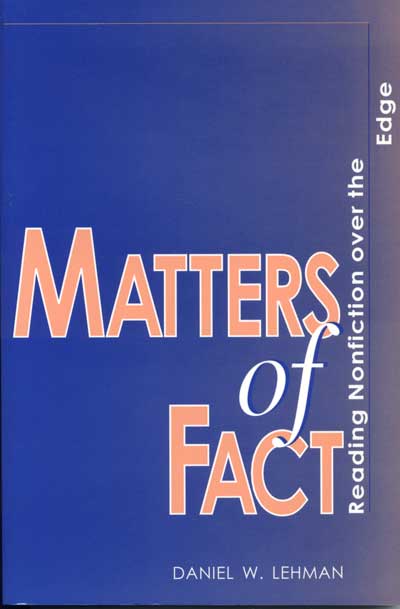
Matters of Fact
Reading Nonfiction over the Edge
Daniel W. Lehman
Matters of Fact examines what happens when writers and readers encounter texts presented as nonfiction: texts that make some truth claim on outside experience, texts whose characters and events have at least some tangible dimension outside the written word.
The current critical climate blurs most meaningful distinctions between fiction and nonfiction. Literary critics have argued that since experiences can be approached only through the stories we tell about them, it is futile to attempt to produce a single “true” account of any event. Daniel W. Lehman approaches the fiction/nonfiction conundrum from another perspective. Rather than attempting to establish distinctions between abstract notions of fiction and nonfiction, he examines the experience of engaging with both kinds of texts. Reading and writing nonfiction, he contends, is fundamentally different from reading and writing even the most strongly realistic fiction.
The difference between the two stems from a recognition that actual subjects are linked to nonfiction texts. An author may try to hide the link by withholding names or changing details, and scholars may try to ignore the link as somehow tainting a purely literary experience, but nonfiction’s operations defeat those efforts. While authors of fiction build worlds that encompass their characters and narratives, a nonfiction text always competes with the lives and events that lie outside it, lives and events it cannot quite contain. Matters of Fact examines how this inside/outside contest plays over a variety of nonfictional texts, ranging from nineteenth-century narratives by Charles Dickens and Henry Mayhew through the writings of Sigmund Freud, John Reed, Tom Wolfe, and Joan Didion, culminating in a discussion of Tim O’Brien, who has written stories of his experience in the Vietnam War in hybrid combinations of fiction and nonfiction.
Written by a former journalist and scholar of narrative theory, Matters of Fact will be of interest to anyone who has ever tried to present the “true” account of another’s life and has discovered that the subjects of nonfiction do not always remain safely inside the text.
Daniel W. Lehman is associate professor
of English and Communication Arts at Ashland University, where he directs
the journalism program and chairs the department of Communication Arts.
|
Jan
1998 224 pp. 6 x 9 |
|
| $55.95 cloth 978-0-8142-0760-4 | Add cloth to shopping cart |
| $23.95 paper 978-0-8142-0761-1 | Add paperback to shopping cart |
| Theory and Interpretation of Narrative |


